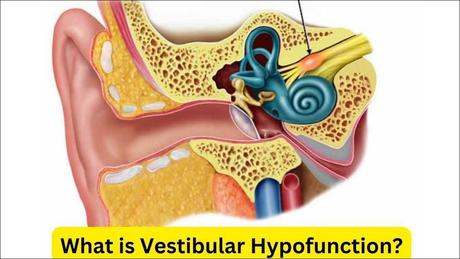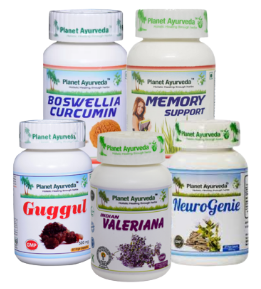Abstract
Ears are a miraculous sense organ that helps us to listen to things. Ear is divided into three parts: the external ear, middle ear and internal ear. Internal ear performs two most important functions that balances the body and helps in balancing the body and changes the vibrations into the electric signal that passes through the auditory nerve. Vestibular hypofunction is a feeling of dizziness that occurs due to certain abnormality in the inner ear. This also leads to troublesome balancing of the body. Recently bollywood actor, Varun Dhawan revealed that he has been struggling with vestibular hypofunction. In the text below, we shall see its detail in detail and we shall also discuss the management of the same in the contemporary system of medicine as well as in the traditional Indian medicinal system of Ayurveda.

Introduction
Vestibular hypofunction is a disorder of the inner ear that is manifested by dizziness, improper balance and equilibrium and troublesome concentration.
There can be many other associated symptoms depending on the cause of the condition. In Ayurveda, the vata dosha, within normal limits, maintains the ideal equilibrium and proper functioning of the sense organs. Vestibular hypofunction in Ayurveda can be correlated according to its symptoms and the vitiation of dosha involved i.e. the vata dosha. Further in this text, we shall discuss the causes, signs and symptoms, investigation and management of vestibular hypofunction. Let's have a look!!
Causes of Vestibular Hypofunction
- Idiopathic: Around 51 percent of the cases are idiopathic that means no cause has been found.
- Toxic/Metabolic: Approx 14 percent cases have been linked to the toxicity of antibiotics, furosemide, aspirin, gentamicin amikacin, alcohol and others. Deficiencies of certain nutrients such as folate, vitamin B12. Hypothyroidism and styrene poisoning also have been linked to the occurrence of vestibular hypofunction.
- Infectious:8 to 12 percent of the cases of vestibular hypofunction have been linked to certain infections such as cerebellitis, lues,meningitis, encephalitis, behcet's disease, borrelia infection, neuritis, herpes simplex virus infection etc.
- Autoimmune: Cogan's syndrome, sarcoidosis, sjogren's syndrome, celiac disease, polyarteritis nodosa, colitis, susac's syndrome etc.
- Neurodegenerative: superficial siderosis, multiple system atrophy, ataxia, polyneuropathy etc.
- Genetic: mutation chromosome 22q, 11q, 6q, 5q, DFNA-4, DFNA-9, DFNA-11, DFNA-9
- Congenital: Enlarged vestibular aqueduct, Alport syndrome, Turner syndrome, Usher syndrome.
- Neoplastic: Neurofibromatosis type 2, malignant tumour, vestibular schwannoma, metastasis of lymphoma.
- Trauma: Iatrogenic (e.g. bilateral cochlear implantation), head injury.
- Vascular: vertebrobasilar dolichoectasia, infra or supratentorial lesions.
- Other ear pathology: Otosclerosis, labyrinthitis, meniere's disease, cholesteatoma.
Signs and Symptoms of Vestibular Hypofunction
- Dizziness
- Nausea
- Difficult walking in busy places
- Vomiting
- Poor balance or imbalance
- Vertigo or visual vertigo
- Inability to maintain posture
- Blurring of vision
- Oscillopsia
- Cognitive deficits
- Psychological or psychiatric symptoms
Investigations
- There are no standardised procedures available to diagnose vestibular hypofunction. But following are some of the tests performed that helps in diagnosing ventricular hypofunction :
- Caloric test
- Head Impulse Test (HIT)
- Torsion swing test
- Rotatory Chair test
- Vestibular -Evoked Myogenic Potentials (VEMP)
- Dynamic Visual Acuity Test (DVA)
- Cerebral imaging
- Audiometry
- Blood tests
Differential Diagnosis
- Cerebellar syndrome
- Autoimmune inner ear disease
- Meningitis
- Sequential vestibular neuritis
- Meniere's disease
- Neurosyphilis
- Congenital malformations
- Cogan's syndrome
- Temporal bone fractures
- Post-binaural cochlear implantation
- Sarcoidosis
Management of Vestibular Hypofunction
- Treating the cause of vestibular hypofunction
- Vestibular suppressants
- Antiemetics to stop frequent vomiting
Physiotherap
- Exercise that promote gaze stability
- Exercises that habituate symptoms including optokinetic exercises
- Exercises that improve goat and balance
- Walking for endurance or aerobic exercises
Precautions/Prevention
- Stopping alcohol and smoking
- Exercising regularly
- Well balanced diet that includes all the nutrition for the proper functioning of the sense organs.
- Lifestyle management
Ayurvedic Aspect and Management of Vestibular Hypofunction
Ayurveda, an ancient medicinal system of India, has been serving mankind from acute to chronic conditions. Ayurveda is based on the three body humours and all the diseases are based on alterations or imbalance of these three humerus (doshas) i.e. vata, pitta and kapha. The condition we are considering here is due to vitiation of vata dosha. Vata dosha, the main dosha, which is involved in all the sensory and balancing functions. Any kind of vitiation of vata dosha leads to the emergence of certain symptoms and diseases.
Vestibular hypofunction is a condition that is characterised by imbalance, nausea, vomiting, dizziness, confusion, vertigo etc. There are many causes that can develop this condition. In Ayurveda the condition can be correlated with pranavarita vyan vayu. This pranavrita vyan vayu leads to hindrance of the functioning of the sense organs. Further it leads to bhrama (a state of confusion and dizziness) and it also leads to weakness, difficult concentration and irritation.
The management of the condition revolves around the correction or balancing of the vata dosha.
General Management Protocol
- Oleation with mild virechan medicines
- Vatanuloman medicines
- Deepan pachan (Appetizing and digestive medicines)
- Medicated enema
- Nasya
- Dhoompana (medicated)
- Sweet, sour and salty and snighdha food.
Management
Shodhan Chikitsa
- Snehana karma
- Swedana karma
- Virecham karma
- Vasti karma
- Rasayan chikitsa
- Nasya and dhoompana
- Karnapoorana
Karna Poorana
Karna refers to the ear and poorana means filling. Karna poorana thus denoyes filling of the auditory canal with medicated oil. Karna poorana has a lot of benefits as it helps in a number of ear diseases. It nourishes the ears, the sense organ. It helps in relieving tinnitus, aids hearing, balances the vata dosha and provides strength to the nerves associated with the ear. With these actions it gives clarity to the mind, thus overcoming the status of confusion. As it pacifies the vata dosha therefore helps in the balancing of the body.
Karna bindu taila and badhirya nashak oil are helpful in vestibular hypofunction.
Shaman Chikitsa
- Vatagajankush ras
- Mahavatagajankush rasa
- Chintamani ras
- Yogendra ras
- Sarvangsundar rasa
- Vatvidhwansan ras
- Rasraj rasa
- Ashwagandha churna
- Panchkol churna
- Rasnadi kwath
- Mashbaladi kwath
- Gokhshuradi kwath
- Rason tail
- Bala tail
- Dashmooladya ghrit
- Ashwagandha ghrit
- Yograj guggul
- Kaishor guggul
- Amrita guggul
- Drakshasav
- Shiva gutika
- Chywanprash
- Brahma rasasyn
- Agnitundi vati
- Praval panchamrit rasa etc are some of the beneficial classical ayurvedic formulations that help in vestibular hypofunction.
Herbs that are useful in vestibular hypofunction include nirgundi ( Vitex negundo), bala ( Sida cordifolia), guggul ( Commiphora mukul), shunthi ( Zingiber officinale), errand ( Ricinus communis), bhallataka ( Semecarpus anacardium), jatamansi ( Nardostachys jatamansi), pippali ( Piper longum), vatsnabh ( Aconitum ferox), brahmi ( Bacopa monnieri) and various others.
Yoga Asanas that are helpful in managing vestibular hypofunction includes halasana, sarvangasana, bhadrasana, vajrasana, surya namaskara, gomukhasana, padmasana etc.
Pathya
Apathya
Herbal Remedies by Planet Ayurveda for Vestibular Hypofunction
Planet Ayurveda is an emerging US-FDA registered, GMP certified and ISO 9001:2015 certified Ayurvedic Company, which adhered to the aim of manufacturing standard Ayurvedic medicines as given in the various ancient scriptures of Ayurveda. Medicines are prepared without preservatives and additives and other kinds of synthesised material which cause many ill effects on the human body. Products manufactured at Planet Ayurveda are pure and devoid of any adulteration. Planet Ayurveda extends its herbal formulations that are helpful in managing the condition of vestibular hypofunction.
Given below are some of the herbal products that are helpful in managing Vestibular Hypofunction
- BOSWELLIA CURCUMIN
- GUGGUL CAPSULES
- NEUROGENIE CAPSULES
- INDIAN VALERIANA
- MEMORY SUPPORT

 Product Description
Product Description


1. BOSWELLIA CURCUMIN
Boswellia Curcumin is a patent product of Planet Ayurveda. It is filled with the goodness of haridra ( Curcuma longa) and shallaki ( Boswellia serrata). It is of great help in inflammatory, infectious and painful conditions. Boswellia Curcumin reduces the pain and other symptoms related to vestibular hypofunction and also helps in the healing of the vestibule. Therefore, Boswellia Curcumin is beneficial in the condition of vestibular hypofunction. This product of Planet Ayurveda wonderfully manages the symptoms such as vertigo, confusion and troublesome balancing of the body.
Dosage: Two capsules twice a day.
2. GUGGUL CAPSULES
Guggul capsules, is a product of Planet Ayurveda which is made up of standardised and pure extract of guggul (Commiphora mukul). Guggul is known for its tridosha shamak (pacifying) and anti-inflammatory properties. It is considered as very beneficial ayurvedic remedy for a number of inflammatory conditions conditions such as amavata (rheumatoid arthritis), psoriatic arthritis, sandhigata vata (osteoarthritis), asthi kshaya (osteoporosis), asthi majja gata vata (ankylosing spondylitis), vatarakta (gout), etc. Guggul has effective results in the case of vestibular hypofunction. Guggul helps in the prevention and managing the condition of neuritis that is inflammation of the nerves. In the case of the vestibulocochlear nerve that is generally involved in the vestibular hypofunction and related symptoms.
Dosage: One capsule twice a day.
3. NEUROGENIE CAPSULES
Neurogenie capsules is a product of Planet Ayurveda, which is filled with the properties of herbs that are regarded as medhya (brain tonic/memory booster) as per Ayurvedic texts which improve and promote mental and neurological functions. The formulation is composed of the herbs ashwagandha ( Withania somnifera) and brahmi ( Bacopa monnieri). These are useful in promoting wellness of the mind and coping up with stress. And also helps in vata imbalance. As the condition of , Neurogenie capsules are helpful in vestibular hypofunction.
Dosage: Two capsules twice a day.
4. INDIAN VALERIANA
Indian Valeriana capsules is a product of Planet Ayurveda which comprises unadulterated natural concentrate of herb tagar (Valeriana wallichii). It goes about as a brain tonic and helps in further developing mind capabilities by forestalling cell harm because of its cell reinforcement property. Tagar is known for its sensory system quieting property and neurological conditions, for example, uneasiness, sorrow, epilepsy, a sleeping disorder and so on. Indian valeriana capsules help in all neurological issues because of its calming and vata pacifying properties. As we saw above, Vestibular hypofunction occurs due the vitiated vata dosha. It gives strength to the nerves thus helps in the nerve related disease. In this manner Indian valeriana is a grand spice that aids in the same.
Dosage: One capsule twice a day.
5. MEMORY SUPPORT
Memory Support capsules are a patent product of Planet Ayurveda. As the name of the product suggests, Memory Support enhances memory and gives relief from the status of confusion because of vestibular hypofunction. It contains licorice ( Glycyrrhiza glabra), brahmi ( Bacopa monnieri), shankhpushpi ( Convolvulus pluricaulis) and vacha ( Acorus calamus) . All the herbs maintain a good nervous well being. It enhances concentration and boosts memory which makes it an effective formulation for the problematic symptoms of the above said condition. Therefore, Memory Support capsules work amazingly in managing vestibular hypofunction.
Dosage: One capsule twice a day.
CONTACT PLANET AYURVEDA TO PROVIDE YOU THE COSTING / ORDERING AND DELIVERY INFORMATION AT - [email protected] OR CALL AT +91-172-5214040Conclusion
Vestibular hypofunction is a common condition that people have been suffering from. It came into limelight after bollywood star Varun Dhawan disclosed this in an interview. It is a condition that can have a number of causes. The symptoms usually include confusion, vertigo and difficult balancing of the body while changing postures and positions. In the contemporary system of medicines there is not proper management available for the same. Whereas in Ayurveda, the condition can be managed with its magnificent ways to pacify the vata dosha, the main culprit behind the occurrence of the disease. The medicines and procedures above mentioned are really helpful in management of vestibular hypofunction. Products of Planet Ayurveda, mentioned above are so good in overcoming the condition as well as symptoms of improper balance, vertigo, nauseas and others.

